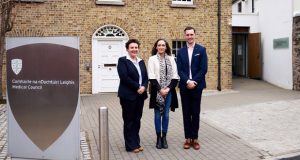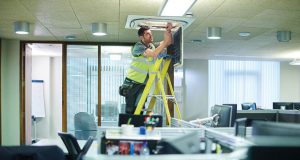 THE WORKPLACE CONSULTANT’S VIEW
THE WORKPLACE CONSULTANT’S VIEW
ANDREW MAWSON,
MANAGING DIRECTOR, ADVANCED WORKPLACE ASSOCIATES
According to our own research covering workplaces employing more than 100,000 people in the UK, office workers spend 3.5 days a week at home on average. This means the organisations responsible for managing buildings – and the people within them – need to offer more innovative services that meet the demands of our hybrid age.
This has inspired AWA to think more innovatively and analytically about workplace design. Crafting workplace experiences tailored to an organisation’s personality can leave a better impression on employees, increase staff retention, and attract the best talent. But this is often challenging for companies that lack innovative thinking. In response, companies must prioritise creativity in their design and delivery of workplace experiences.
FM companies need to better understand the organisations they serve and any tensions within them. Understanding the personality and drivers of an organisation is also critical because it helps facilities managers design and deliver meaningful and unique workplace experiences that enrich lives and positively support people in their daily work, wherever they are working.
Given that most employees are working from home for more than two days a week, FMs should consider the services they can deliver within homes as well as offices. Doing this will help their clients deliver on their duty of care for physical safety and mental wellbeing. To that end, it’s also crucial that they approach the employee populations as consumers — looking at them as different subgroups who have specific needs, not with a one-size-fits-all approach.
FMs must support their client organisations with technology solutions that maximise the utilisation of their office space, use energy more effectively, and give people and teams the environments they need and when they need them. This can all be achieved through dynamically scheduling space across a week on a demand-led basis. More needs to be done to work towards creating low-carbon buildings. Energy management and the effectiveness of the materials used in the building are also crucial factors. Innovative service providers can drive down carbon by measuring and managing it, as well as thinking beyond the buildings and offering services to employees who are not necessarily present on site.
Too many FM organisations are still stuck in delivering commodity services with leadership teams that are more likely to have grown up in the construction world than the tech world. What they need are innovative leaders who reframe their missions and deliver valuable services at a decent price. The world of work has changed. It’s ‘the hybrid age’, and FM suppliers must help their customers to provide infrastructure, services and experiences that support people’s changing needs.
 THE FM STRATEGIST’S VIEW
THE FM STRATEGIST’S VIEW
INNA LIM,
DIRECTOR OF STRATEGY, MARKETING AND EXECUTION, CORPORATE SERVICES, SODEXO UK & IRELAND
Quite simply all FM suppliers need to innovate, at all times, not just during a recession or in a period of economic uncertainty. The workplace doesn’t stand still. It is always evolving and moving forward, and technology, creativity and sustainability are some of the main drivers of this. Never more so in recent times following the pandemic. If you’re not innovating your competitors probably are, and will overtake you in the war for talent and delivering initiatives clients now expect and need.
The UK FM market is dynamic despite the economic uncertainty, yet conditions remain very challenging for clients. To combat this FM suppliers really need to differentiate themselves, be compelling and show up exceptionally to mitigate the risk of change to prospective clients and retain existing clients. There is a growing trend of FM contractors focusing on specialism rather than broad-spectrum service delivery, in order to develop more defined brands and enhance margin opportunities. Nevertheless, bundled FM services are expected to continue, rising by more than 13 per cent.
Service providers need to be innovative and strategically creative. FM companies will need to significantly strengthen their sustainability and energy efficiency capabilities. Sustainability is becoming increasingly diverse, moving beyond climate action, energy management and resource optimisation. Companies are using M&A to drive their ESG agendas either through disposal of old tech companies or through acquisitions of new net zero technology.
FM providers also need to focus on innovation with their own employees to maintain a competitive edge. The cost-of-living crisis is driving UK employees to seek new jobs or more help from employers. Eighty four per cent are experiencing stress and anxiety due to cost of living, and 62.5 per cent would leave their job if their employer doesn’t recognise their struggles or offers no support. To avoid the cost of recruitment and loss of expertise companies need to rewrite the rule book to retain and attract the best talent. Wellbeing initiatives are fast becoming the norm and employees are more much empowered on where they choose to work.
Finally, innovation through food is also key during the uncertain times. Fifty per cent more product launches make a health claim than in the 2008 recession, demonstrating what consumers prioritise and see as important. This offers FM providers a real opportunity to connect with consumers and offer more flexible food service solutions, which in turn can boost productivity in the workplace and encourage clients’ employees to return to the office.





